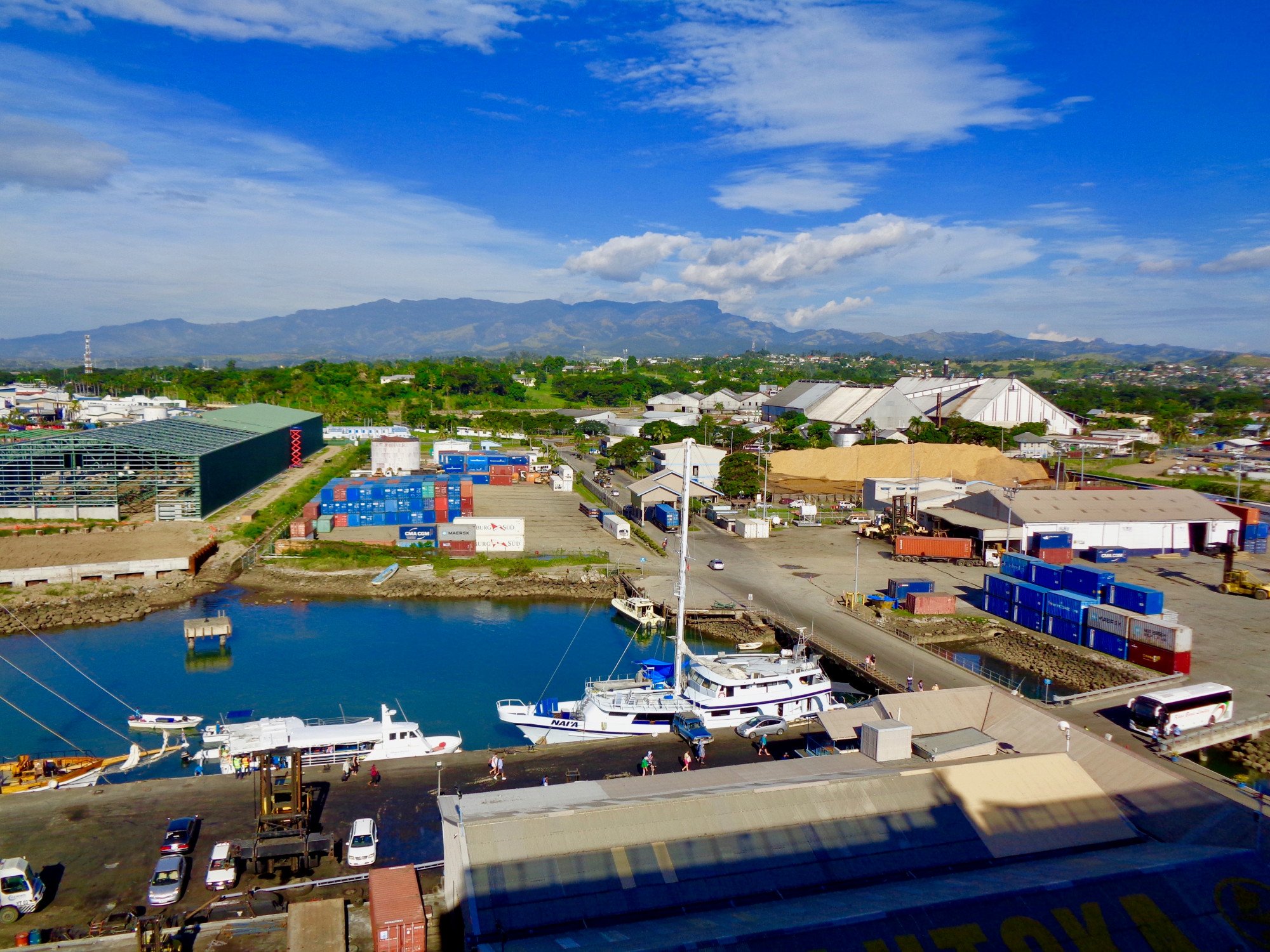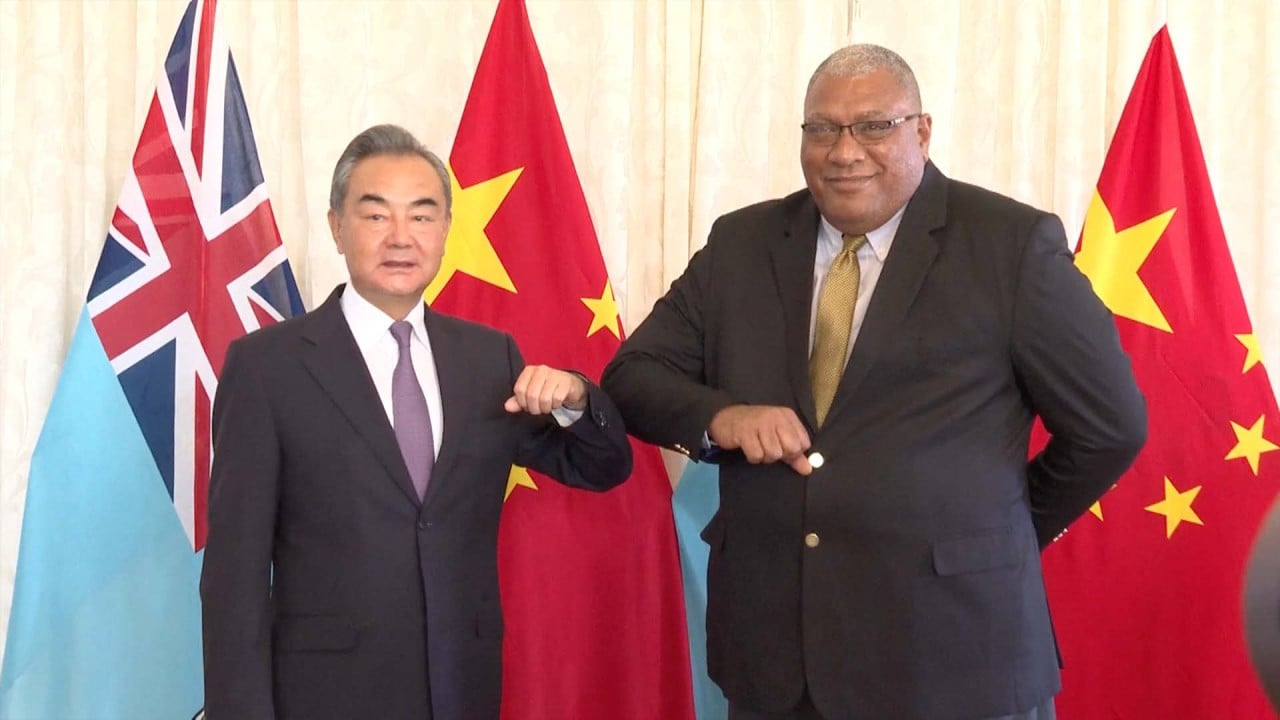Fiji woos China for upgrade of ‘strategically important’ ports even as debt concerns mount
[ad_1]
Fiji suspended a police training deal with Beijing earlier this year.
“Like many Pacific leaders, Rabuka senses that this time in the geostrategic light is an opportunity to boost livelihoods through an emphasis on commercial relations,” said Henryk Szadziewski, affiliate at the Center for Pacific Islands Studies at the University of Hawaii. “If he can achieve this goal, it would provide an interesting template for other states attempting to control polarising power politics.”
While Western nations are left speculating over the motivation of Rabuka’s China pivot, analysts say simple pragmatism is at play.
“In the end, he is about Fiji and getting things for Fiji,” said Graeme Smith, associate professor of politics at Australia National University, adding Rabuka had already “reached out to Australia” for help with the shipbuilding programme .
‘Our values differ’: Fiji rethinks China security ties as Pacific tensions rise
‘Our values differ’: Fiji rethinks China security ties as Pacific tensions rise
Fiji has some of the best ports among developing Pacific nations, a boon to its exports of sugar, rice and bottled water label Fiji Water.
Upgrading them would be quicker than starting from scratch in places that Beijing might have security goals in the region, notably the Bina Harbour project on Malaita in the Solomon Islands.
Climate change-fuelled tropical cyclones have damaged ports in countries indebted to China, such as Tonga and Vanuatu, and may also make Fiji appear attractive to Beijing.
Fiji’s port of Lautoka is on the west coast of the main island Viti Levu near the Bligh Water, the centre of Fiji’s dreams for the future.
“Its location is strategically important for Pacific maritime routes, and in particular for connecting Fiji to the global economy,” said Mihai Sora, a research fellow in the Pacific Islands Programme and project director of the Aus-PNG Network at Australia’s Lowy Institute.

Build now, pay later?
But first, there are questions over money.
Fiji has debt of some US$4.29 billion, most of it domestically held.
Of this debt, the nation owes US$167.5 million to the Export-Import Bank of China, according to a Fiji finance ministry report.
Government-owned Fiji Ports Corporation Limited (FPCL) took US$77.5 million in bank loans to upgrade port facilities in the early 2000s.
Last year, Fiji’s then economy minister Aiyaz Sayed-Khaiyum said it would cost the FPCL US$26.7 million to clear Suva Harbour, Lautoka and Levuka port of 17 sunk vessels and 32 wrecks.
From Papua New Guinea to Vanuatu, China has some US$1.3 billion in outstanding bilateral loans across the Pacific Islands, according to a December 2022 report by New Delhi-based think tank Observer Research Foundation.
Solomon Islands hosts China-funded Pacific Games amid big-power rivalry
Solomon Islands hosts China-funded Pacific Games amid big-power rivalry
In 2020, the Solomon Islands sought US$100 billion in loans, according to Reuters, after cutting diplomatic ties with Taiwan.
This resulted in the Solomon Islands becoming a crucial chess piece for Beijing’s Belt and Road Initiative. Last year, the Solomons took a US$66 million loan from China to install 161 Huawei telecommunication towers, while Beijing stumped up US$119 million into the ongoing Pacific Islands Games in Honiara, a win for Prime Minister Manasseh Sogavare in attracting leaders from across the region to the island group.
“China is at pains to brand itself as both a leader and fellow member of the Global South,” Sora of the Lowy Institute said. “Xi would have been looking to woo Rabuka by promising something he knows the Fijian prime minister wants – not more security cooperation with China, but more support for infrastructure projects.”
China has dismissed talk of geopolitical agendas, saying its goal is development and commercial ties.
“If we really need to compete, let’s see who provides more effective assistance to Pacific Island countries,” China’s ambassador to Fiji Zhou Jian said last week.
Jobs for whom?
But Chinese financing alone does not guarantee fast friendship with the Pacific nations, experts say, citing the failure last year of Chinese foreign minister Wang Yi to seal a regional security pact that was widely rejected by 10 Pacific nations.
Fiji’s government did not immediately reply to questions on the nature of the partnership with China. But experts warn of adding to the nation’s debt.
“With Fiji’s debt levels already high, it would be sensible for China to be careful about offering another huge infrastructure loan, unless the conditions are extremely favourable to Fiji,” Sora said. “There’s not a lot of transparency about the details, yet.”
Fiji’s locals are also anxious about Chinese workers taking on the job of building their nation’s infrastructure.
“Chinese contractors will be the people pushing the deals and hustling on the ground,” Smith of ANU said, explaining they would have “some capacity down the line to have maintenance work done on Chinese ships”.
[ad_2]
Source link


